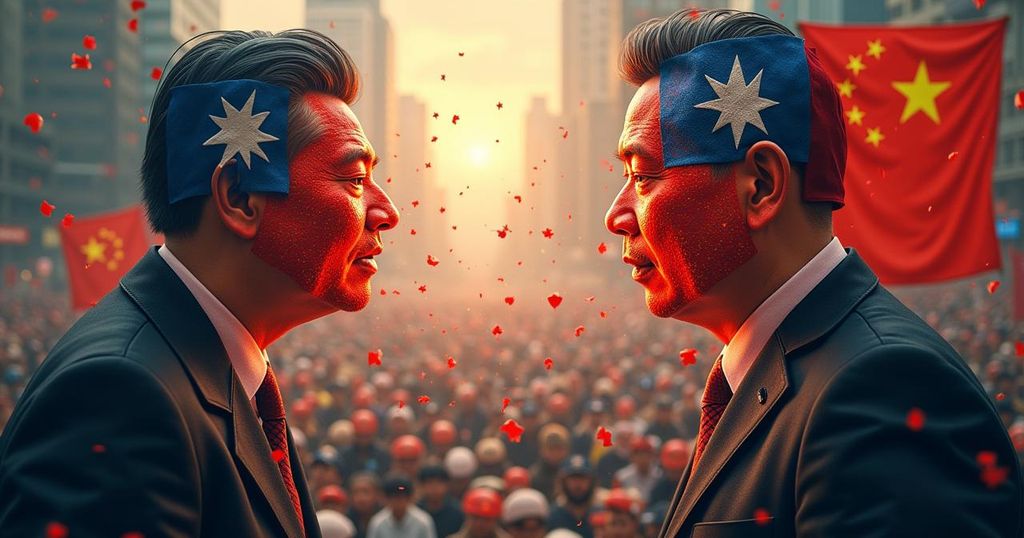Understanding the Tensions Between China and Taiwan
China’s military drills around Taiwan underscore escalating tensions, particularly after the election of pro-independence president William Lai. Historical claims to the island and divergent political identities complicate the relationship, with Taiwan asserting its autonomy while facing intense pressure from China. The U.S.’s commitment to Taiwan adds further complexity to the situation, which has significant implications for international relations.
Recent military exercises conducted by China around Taiwan have sparked renewed tensions, particularly following the inauguration of Taiwan’s new president, William Lai. These military drills simulate a potential invasion, highlighting China’s ongoing claim to Taiwan as a breakaway province that it intends to reintegrate into the country, potentially through force if necessary. Conversely, many Taiwanese citizens identify as a distinct nation and prefer the status quo, where Taiwan maintains its current level of autonomy without formally declaring independence or reuniting with China. The historical context of China-Taiwan relations traces back to early settlers and various governance changes, from Austronesian tribes to colonial rule and eventually to the Republic of China (ROC) post-World War II. After a civil war in China, remnants of Chiang Kai-shek’s government fled to Taiwan, establishing a dictatorship that lasted until the late 20th century. With the introduction of democracy in Taiwan during the 1990s, the island developed its own political identity, albeit one that China does not recognize. International recognition of Taiwan remains contentious. Despite Taiwan having its own constitution, a democratically elected government, and a significant military force, recognition of the ROC has dwindled, with only 12 countries remaining that acknowledge it as a sovereign state. Beijing employs extensive diplomatic efforts to isolate Taiwan internationally and discourage any recognition. Relations between Taiwan and China initially improved in the 1980s; however, tensions resurfaced with the election of pro-independence leaders like Chen Shui-bian in the early 2000s and Tsai Ing-wen in 2016, who has faced increasing hostility from Beijing since assuming office. China’s recent military drills are perceived as a direct consequence of the election of William Lai, characterized by Beijing as a provocateur advocating for Taiwanese independence. The United States plays a prominent role in this dynamic. Although it officially recognizes Beijing as the sole Chinese government, it also acts as Taiwan’s principal ally, bound by law to provide defensive support. The U.S. stance has evolved, particularly under President Biden, who has indicated a readiness to militarily defend Taiwan—a departure from the previous policy of strategic ambiguity. As Taiwan’s election outcomes influence U.S.-China relations, the ongoing military provocations from China and responses from the U.S. signal a precarious balance that has far-reaching implications for East Asian stability.
The tensions between China and Taiwan stem from historical, political, and cultural factors that have developed over centuries. Taiwan’s complex status results from its colonial past and its claim to sovereignty based on democratic governance, contrasting sharply with China’s position that views Taiwan as an integral part of its territory. The geopolitical ramifications of these tensions significantly affect international relations, particularly involving major powers like the United States, which seeks to navigate its commitments to Taiwan while maintaining relations with Beijing.
The current tensions between China and Taiwan are deeply rooted in historical claims, political identities, and international dynamics. As military activities from China increase and Taiwan’s electoral outcomes unfold, these tensions are poised to impact not only cross-strait relations but also the broader landscape of U.S.-China relations. The delicate balance requires careful diplomatic engagement from all parties involved, particularly as Taiwan continues to assert its autonomy whilst navigating the complexities of international diplomacy.
Original Source: www.bbc.com





Post Comment